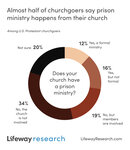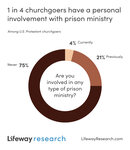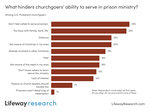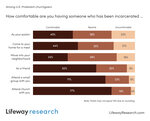



Churchgoers are more interested than involved in prison ministry, but most say they’d be fine sharing a street or a pew with someone who has been incarcerated.
A Lifeway Research study sponsored by multiple prison ministries surveyed U.S. Protestant churchgoers’ actions and attitudes toward inmates and those who have previously been in jail, prison or a juvenile facility.
“Our goal with the study was to not only discern the current state of churchgoers’ views on the incarcerated and their families but to use this knowledge in assisting churches for greater effectiveness in discipleship,” said Karen Swanson, director of the Correctional Ministries Institute at Wheaton College’s Billy Graham Center. “Following Jesus’ words in Matthew 25 to care for the incarcerated is central to discipleship, and this research is critical in equipping church leaders to encourage and exhort their people to be faithful to this mission.”
One in 4 churchgoers (25%) have been involved in ministry among the incarcerated, formerly incarcerated or their families, including 4% who say they are currently participating. Additionally, 10% say they have been involved in prison ministry activities or training.
When asked about specific examples of ministry, at least half of churchgoers said they had no experience in serving the incarcerated or their families. They are most active in assisting families with loved ones in prison. Around a quarter (24%) have participated in this in the past, 13% say their church has engaged with this but they have not personally, 13% have only heard about this outside of their church and 50% say they have no experience. Additionally, 21% have participated in assisting children with parents in prison, 13% say their church has done this, 13% say they’ve only heard about it and 53% have no past experience with this type of ministry.
Other types of ministry are less common among churchgoers. Fewer than 1 in 5 say they have written letters or cards to prisoners (18%), visited prisoners in person (18%) or engaged in in-person prison ministry (11%). Even fewer say they’ve done in-person aftercare ministry with former prisoners (9%) or been a foster parent for children with incarcerated parents (6%).
“Many churchgoers are largely unaware of specific opportunities to minister to the incarcerated, the formerly incarcerated and their families,” said Scott McConnell, executive director of Lifeway Research. “Yet large majorities of churchgoers believe churches have a responsibility to care for them.”
Churchgoers express interest levels that outpace their actual ministry experience. Most have some significant level of desire to participate in ministry that serves the children and families of those in prison.
More than half (55%) say they are at least somewhat interested in assisting children with parents in prison, including 28% who are very interested. Similarly, 51% say they are interested in assisting families with incarcerated loved ones, including 24% who say they’re very interested. Slightly fewer (46%) say they are at least somewhat interested in writing letters or cards to prisoners, while 33% say they aren’t interested at all.
Around a third say they are at least somewhat interested in helping with in-person aftercare for former prisoners (34%), in-person ministry with prisoners (33%), in-person visits to prisoners (33%) and fostering children (30%).
As to what keeps churchgoers from participating in prison ministry, a quarter say it’s because they don’t feel called to serve prisoners (26%) or they are too busy (25%), while 20% point to the distance involved and a lack of awareness of ministries in their area.
Fewer say they’re already involved in other ministries (18%), fearful (16%), not aware of a need in their area (16%), don’t know where to learn about ministry (15%) or have a lack of interest (14%). Less than 1 in 10 (7%) believe this should be handled by pastors or church leaders. Just 1% say they aren’t involved in prison ministry because the prisoners aren’t deserving of redemption.
A 2016 Lifeway Research study of U.S. Protestant pastors found they’re most likely to point to a lack of volunteers (65%) and training (62%) as hindering their church from helping the incarcerated and their families more. When asked about barriers to serving more, fewer pastors pointed to a lack of finances (48%), not knowing where to start (40%), having too many other ministries (29%), the church already providing sufficient help (22%) or not seeing the need for this type of ministry (21%).
“There appears to be untapped interest and willingness among many churchgoers to participate in prison ministry in some way,” said McConnell. “Though many personal hindrances to serving exist, some only point to a lack of understanding local needs and ministries in which they could serve.”
Regardless of their involvement, churchgoers believe prison ministry is a worthwhile investment. More than 4 in 5 say formerly incarcerated people can contribute to understanding the gospel message (94%), formerly incarcerated people can be leaders in the broader Christian community (89%), prison ministry contributes positively to public safety (86%) and Christians have a responsibility to minister to the incarcerated (84%).
Additionally, most believe volunteers will benefit from their involvement. Around 4 in 5 churchgoers (79%) agree prisoners can bless community volunteers who serve in prison ministry.
Churchgoers believe their churches should be involved with prison ministry in some way. Around 3 in 4 say local churches have a responsibility to care for families and children of the incarcerated in their community (75%) and provide resources and support for youth and adults leaving correctional facilities (74%). Two in 3 believe local churches have a responsibility to care for the incarcerated in their community (66%).
Almost half of churchgoers (48%) say they’ve heard a sermon at their church that mentioned the incarcerated or formerly incarcerated within the last three years, including 41% who’ve heard one in the last year. A larger percentage of pastors in the 2016 study (60%) said they had preached a sermon on the topic in the past three years.
While most churchgoers aren’t personally involved with prison ministry, they may have a congregational connection beyond hearing sermons. Only a third (34%) say their church is not involved with prison ministry. Almost half (47%) say there is some type of ministry, including 12% who say there is a formal prison ministry, 16% have an informal one at their church and 19% say there’s not a ministry at their congregation but members are involved in serving. Another 1 in 5 (20%) say they aren’t sure what their church is doing related to prison ministry.
Additionally, churchgoers were asked about activities their church was currently involved with related to post-incarceration ministry. Around 3 in 10 say their congregation provides counseling for families of individuals during incarceration or returning from correctional facilities (30%) or for individuals returning from correctional facilities (29%). Close to a quarter say they talk about imprisonment openly so the topic is not so taboo (24%) or support residential programs that help with reentry of people leaving correctional facilities (23%). Another 16% say their church financially supports a ministry outside the church serving the incarcerated and their families. Half (51%) say their congregation is not involved in a prison ministry.
Having a congregational connection to prison ministry makes the church more likely to be engaged. Churchgoers in a congregation with someone doing prison ministry are more likely to say their church is involved in each of the various types of ministry during and after incarceration. Among the churchgoers with this connection, 25% say their church is not doing any of the ministry options for those currently incarcerated, and 26% say the same about ministries for those leaving correctional facilities.
“According to churchgoers, a large portion of prison ministry work is done outside of a formal church ministry, while most still place a responsibility upon the church to care for the incarcerated,” said McConnell. “Individuals are serving through a variety of activities in thousands of correctional facilities.”
The 2016 study found pastors were more likely to spot specific areas of service within their congregation. Around 3 in 5 U.S. Protestant pastors said individual members ministered to families of the incarcerated (61%) and individual members ministered to people leaving correctional facilities (58%). Almost half (45%) said individual members were ministering in correctional facilities.
When asked about the involvement of their church at that time, 57% of pastors said they talked about imprisonment openly so that the topic was not taboo, 47% financially supported a ministry outside the church serving the incarcerated or their families, 45% provided counseling for families of individuals returning from correctional facilities and 43% provided counseling for individuals returning from correctional facilities.
In general, churchgoers hold positive views of those who are or have been incarcerated. For many, their perspective comes from knowing friends or family who have been behind bars or even having the experience themselves.
Almost half of churchgoers (45%) say they have had a friend or acquaintance spend time in jail, prison or juvenile facility. More than a third (35%) say an immediate family member has been incarcerated. The same percentage (35%) have personally visited a correctional facility, and 12% have themselves been incarcerated. Around a quarter (26%) say someone in their family has been a crime victim. Similar numbers (27%) say they haven’t been connected to the justice system in any of these ways.
Churchgoers predominantly view most people who have been incarcerated as deserving a second chance (79%) and deserving of help (69%). Fewer see them as specifically victims of their circumstances (24%) or as trustworthy as anyone (18%). Still, few have negative perceptions like viewing them as likely to commit more crimes after their release (19%), dangerous (9%), dishonest (8%), basically bad people (4%) or not worth the money and time to rehabilitate (2%).
One in 5 churchgoers (19%) believe most people who commit crimes have little hope of changing for the better, while 9 in 10 (89%) say most people with a felony can go on to lead productive lives with help and hard work.
Perhaps because of that, few churchgoers express discomfort with having personal connections with those who have been incarcerated. Around 1 in 5 say they would be uncomfortable with a formerly incarcerated person serving as their pastor (23%), coming to their home for a meal (21%) or moving into their neighborhood (18%). Fewer express an uncomfortableness with having one as a friend (8%), attending a small group with them (6%) or attending church with them (4%).
“The large number of churchgoers who have had personal connections with those who have been incarcerated and their families reveals that many churches have built-in opportunities to serve those they know,” McConnel said. “This may explain one reason prison ministry is organically taking place in many more churches than it is formally planned.”